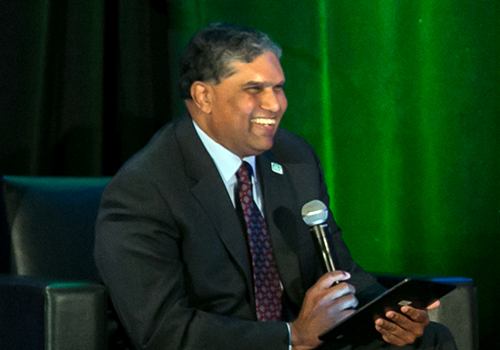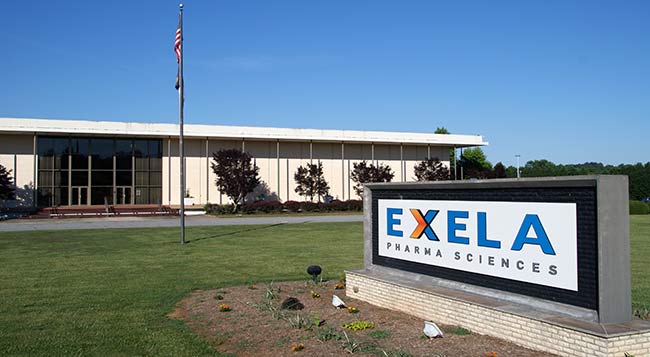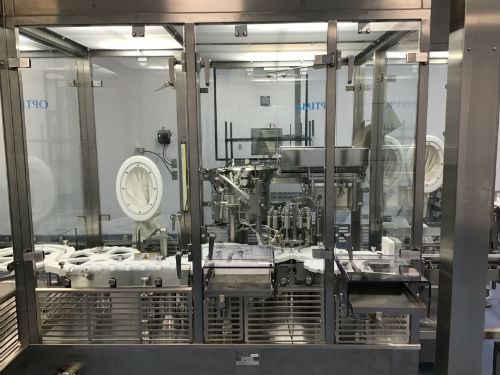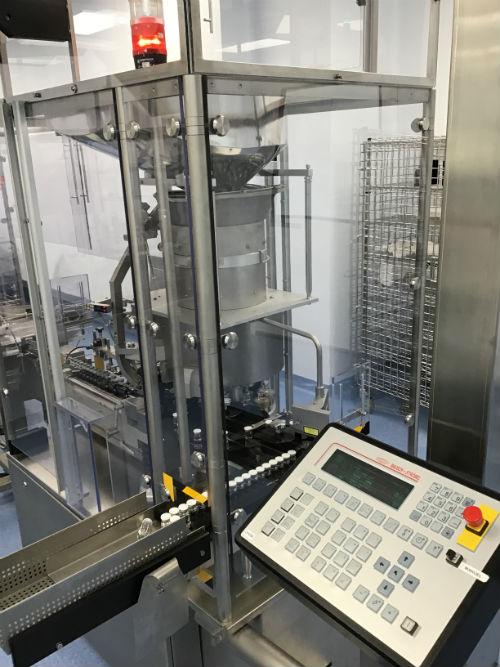
Lenoir’s Exela Pharma Sciences Delivers Injectables – and the American Dream

At a national hospital conference in Chicago last year, Phanesh Koneru, president and CEO of Exela Pharma Sciences, a specialty pharmaceuticals manufacturer in Lenoir, had the rare opportunity to interview former President George W. Bush, the conference’s keynote speaker, on stage.
“It was a very humbling experience,” Koneru recalls. “I can’t really put it into words. It was really something special.”
Koneru questioned Bush for an hour on a wide range of events during his presidency, including 9/11 and the financial bailout of Wall Street, as well as current events. Then Bush turned the spotlight toward Koneru’s own personal story as an immigrant who became a successful entrepreneur in the United States.
“How great it is that someone who grew up in a small village in India can come to the U.S., be successful and be interviewing a president of the United States of America,” Bush said. “How great a country is this?”
Bush and the audience of nearly 5,000 people answered with a two-minute standing ovation.
“It brought me to tears,” Koneru says. “I can say I will never forget that moment.”
Early aspirations
The seeds of Koneru’s American dream were planted in the 1960s when he was a boy growing up in a rural Indian village of about 80 people with no running water or electricity.

“I wanted to come to the States because I was inspired by the Apollo missions with the moon landing back in 1969,” he remembers. “I wanted to be in a country where it was at the pinnacle of technology.”
After earning bachelor’s and master’s degrees in pharmacy at Andhra University in India, in 1982 he immigrated to America, where he gained his U.S. citizenship, worked as a registered pharmacist and continued his education.
He received a Ph.D. in biomed chemistry from the University of Southern California and then a law degree from the University of San Diego while working full-time as a pharmacy manager. He went on to add a master’s degree in law with honors from Columbia University in New York.
After two years as an associate patent attorney for law firms in New York and Palo Alto, Koneru spent the next four years as vice president of intellectual property and chief patent counsel for Watson Pharmaceuticals in Corona, Calif., for four years. Watson, now part of Teva, was one of the leading companies in generic medicines.
“I was learning a lot there but was frustrated with some of the things they were doing,” Koneru says. “They were slow to react to the competition. I thought a company could do more to be ahead of everyone else. So I left the company to start something that suited my speed and my passion.”
He opened a small R&D lab in India but aspired to have a pharmaceutical manufacturing plant in the United States.
Finding Lenoir
Koneru searched America for an affordable facility. And he found one in Lenoir, North Carolina. It had been vacant for four years, and was priced to sell. Though Lenoir was a small town in the rural foothills, away from the state’s renowned technology hubs, it offered good weather, a low cost of living, affordable labor, ample water and a large power grid established during the town’s earlier furniture-making days.

Backed by venture capital, government grants and loans, investments by family and friends, and his own funds, Koneru bought the facility in 2008, renovated it and shifted operations from India to Lenoir.
“We started here from the ground up,” he says.
Today, Exela Pharma Sciences has grown to 320 employees, and it’s hiring more.
“I want to continue to build here in Lenoir so we continue to add to the jobs and take care of the jobs we have.” Koneru says. “We have a lot to offer to industry, to healthcare institutions. There’s a lot going on here for us.”
Making sterile injectables
Exela develops, manufactures and markets sterile injectable products, primarily for use in hospital operating rooms and emergency rooms in the United States and Canada.

The products, mostly generics, include sodium nitroprusside and verapamil for controlling blood pressure, caffeine citrate for opening up lungs in newborns and magnesium sulfate for delaying the premature contractions of pregnant women.
The company started making product for FDA filing purposes in 2010 and began commercial manufacturing in 2012. Today it sells 20 products. Most are under the Exela label, and some are manufactured for other companies under contract.
Exela’s portfolio includes products to help hospitals overcome supply shortages of critical fluids.
“We have been a big supporter of helping hospitals avoid drug shortages,” Koneru says. “We think of it as a service. It’s not a price-gouging opportunity.”
He recalls when one North Carolina hospital was low on saline as the weekend approached.
“I don’t know how you can run a hospital without saline,” he says. “So they were desperate.”
Exela manufactured the product for the hospital, and the delivery was scheduled for the coming week. But the hospital couldn’t wait until then.
“It was like 5 o’clock on Friday, so what we did is, we packed the saline – 2,000 or so bags – in my SUV. And I delivered them that night in the Triangle area,” he says.
Room to grow
Exela owns and operates a 20,000-square-foot sterile manufacturing facility that’s fully compliant with contract Good Manufacturing Practices (cGMP) and another 85,000 square-foot facility that is being validated, or prepared for FDA approval.

In addition, it owns a 145,000 square-foot building that houses laboratory, warehouse, inspection, packaging, labeling and administrative functions. Another 155,000-square-foot building is in reserve for future expansions.
Exela has recruited technical staff from outside the region, but relies on local workers for its manufacturing operations. About 80 percent of employees are from Caldwell County and neighboring Alexander and Burke counties. The remaining 20 percent commute from 15 other counties throughout the region.
“The story of Exela Pharma Sciences is exceptional independent of the fact that it was started and has grown in Lenoir, where the furniture manufacturing industry had once been the major employer,” says Jonathan Snover, Ph.D., executive director of the Western Office of the North Carolina Biotechnology Center. “It is a testament to the idea that a great entrepreneur can succeed outside of North Carolina’s urban and technology hubs and bring opportunity to the more rural communities.”
Despite Exela’s success, the company “went through lots of ups and downs” in its formative years, Koneru says.
“I think what kept us going is, really, we have a strong foundation of principles which we believe in,” he says. “We believe in hard work, innovation and flexibility. We are really nimble. We want to do the right thing. We believe in those values. We believe in the American dream.”
